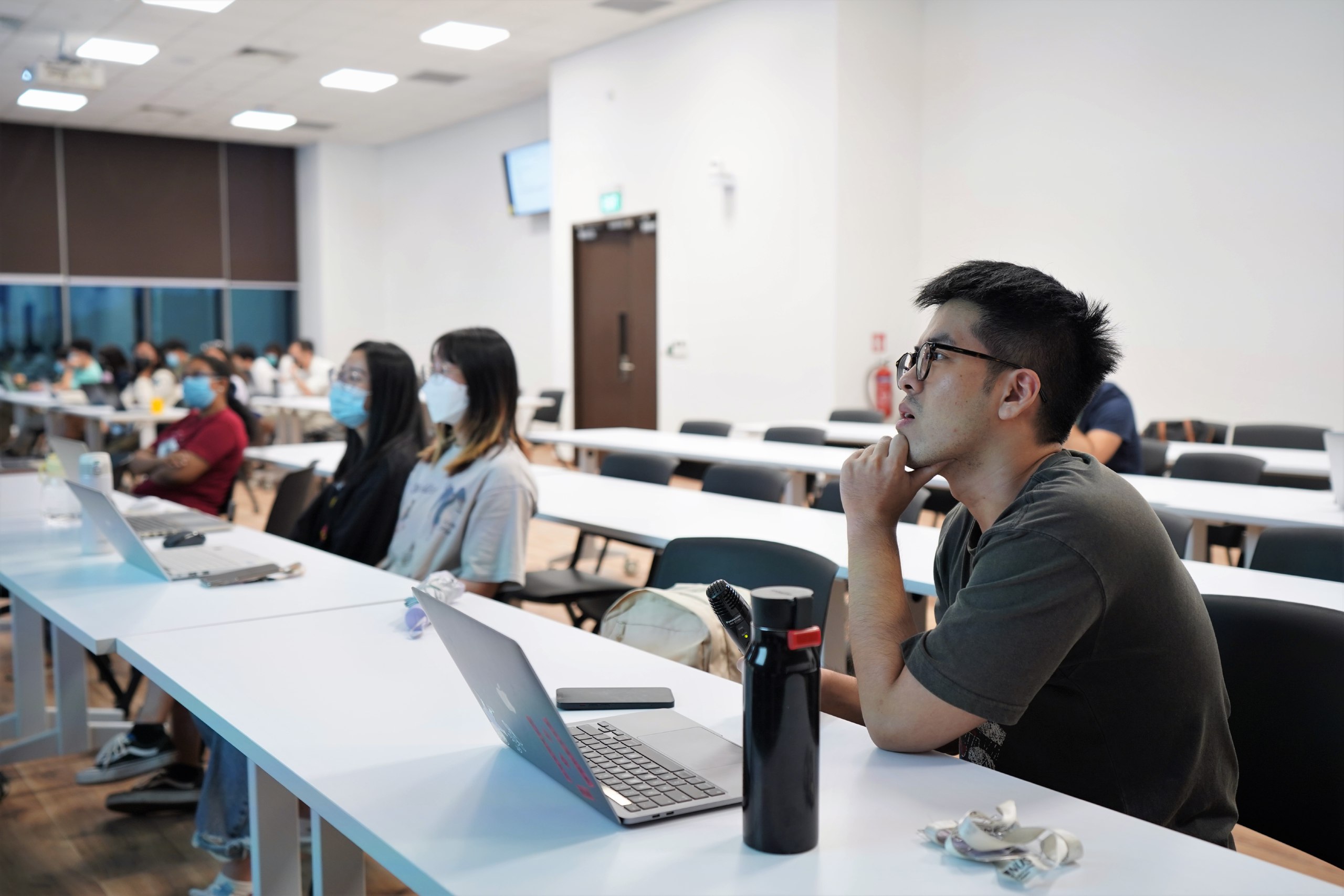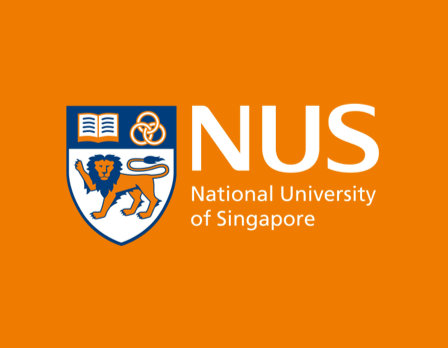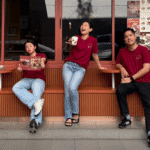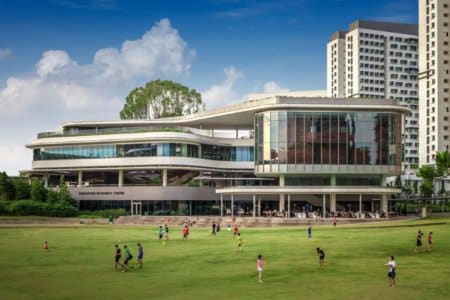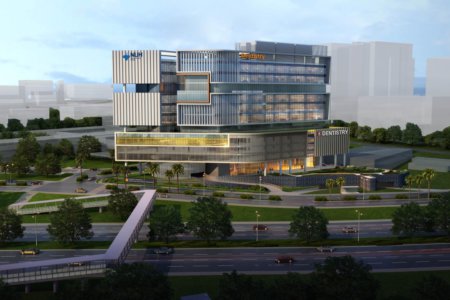Madhumitha Ramanathan’s fascination with the world of healthcare and technology began early. Growing up in Chennai, India, in a family of doctors, she was naturally drawn to the ways medical science could improve lives. Their conversations made her even more intrigued by how technology could amplify those efforts — how devices, tools, and systems could make healthcare more accessible and effective.
“They often spoke at length about Biomedical Engineering and how it had the potential to transform healthcare through innovative technologies, especially in diagnostics, treatment, and preventive care,” she shares. Inspired, she decided to expand her knowledge and gain global exposure after completing a biomedical engineering degree locally. The National University of Singapore’s (NUS) MSc in Biomedical Engineering was her top choice for many reasons.
Firstly, it was located in a city-state known for being a key player in advancing healthcare technology. Government initiatives like the Research, Innovation, and Enterprise 2025 plan allocated US$25 billion to invest in science and technology. World-class infrastructure, including Biopolis and the MedTech Hub, sparks the kind of collaboration between academia, industry, and research institutions few other countries can replicate. Singapore is even home to over 250 MedTech companies — think global leaders like Medtronic and innovators like JN Medsys, the first in Asia to commercialise a digital PCR system.

Ramanathan credits her time at NUS with shaping both her skills and aspirations. Source: National University of Singapore
Location aside, NUS’s prestige was hard to ignore. Apart from ranking eighth globally and first in Asia in the QS World University Rankings 2025, it’s Singapore’s most established university with a history of over 115 years. Its Department of Biomedical Engineering (BME) has more than two decades of experience in fusing expertise from engineering, life sciences, and medicine.
Over the years, expert faculty here have focused their efforts on critical areas such as biomaterials, biomechanics, and bionanotechnology, as well as driving advancements in Tissue Engineering, Medical Imaging, and Medical Devices. Their diverse projects, innovating everything from nanoscale devices to RNA-based biosensors, directly inform curricula to ensure students stay at the forefront of a fast-growing field.
Indeed, a BME education is all about bridging the gap between the theoretical and the practical. This is especially true for those pursuing the MSc in Biomedical Engineering. In fact, this programme was built to cultivate “holistic engineers” through advanced analytical skills and comprehensive biomedical knowledge.
Each class, with its unique topic and instructor, reveals a new layer of understanding. The diversity of students further enriches the learning experience. “In class, students come from different undergraduate backgrounds, and we fulfil each other’s strengths and weaknesses,” says Kevin Jonathan Gunawan from Indonesia.

All MSc in Biomedical Engineering classes are led by expert instructors. Source: National University of Singapore
Multidimensional learning at its finest
One of the most memorable parts of Ramanathan’s experience was the breadth of this MSc’s coursework, which went far beyond what she had encountered in her undergraduate years. The BN5208 Biomedical Quality and Regulatory Systems course, for instance, opened her eyes to the critical role of regulatory frameworks in ensuring that medical devices are both safe and effective. “It was the first of its kind I encountered,” she says. “Another class I really enjoyed was BN5207 Medical Imaging Systems.”
Courses on Tissue Engineering had a similar effect on Gunawan. The MSc in Biomedical Engineering’s project-based learning model has further deepened his interest in this area. “The BN5303 course covered tissue engineering’s role in food science, which is what caught my attention in the first place,” he says. “I especially liked how it featured a project that allowed us to strategise our own company to understand the market and the overall field better.”
Gunawan especially loves how the programme blends biology, physics, chemistry, mathematics, AI, design, and business into one dynamic degree. He describes the array of topics as “thrilling” and “eye-opening” — it’s helped him realise that thriving in biomedical engineering requires a broader perspective, one that integrates diverse subjects and approaches.
Hence, the MSc in Biomedical Engineering also offers courses in Biofluid Dynamics, Cellular Bioengineering, Advanced Biomaterials, Orthopaedic Biomechanics, Computational Biomechanics, Medical Robotics, Frontiers in Neurotechnology, Pre-Market Requirements and Post Market Surveillance, Advanced Human Motion Biomechanics, and several others.
Courses are delivered by a world-class faculty with diverse expertise. Dr. Leo Chen Huei is one of them – he fuses Pharmacology and Therapeutics with innovative approaches like game-based learning and AI-driven assessment.

Gunawan is currently weighing the possibilities of entering the industry or pursuing a PhD. Source: National University of Singapore
What Dr. Leo and all MSc instructors have in common is their commitment to student success. “My professors are very responsive when it comes to answering any questions I might have or providing referrals if needed,” shares Gunawan.
Ramanathan has also benefited from their dedication, stating: “They were always friendly, engaging, and ready to help. Many of them are experts in their respective fields, and their work and backgrounds are nothing short of inspirational.”
So enjoyable were their classes that Ramanathan even discovered a new passion: Medical Device Regulation. The more she learned about the process of bringing medical devices to market, the more she realised how vital regulatory affairs were in ensuring the safety and efficacy of healthcare technologies. To deepen her knowledge, she decided to pursue a professional certification in Medical Device Regulatory Affairs as soon as she completed her MSc programme at NUS.
With plans to eventually take on a PhD, she credits the university for helping her unearth the direction she was meant to take. “It gave me a lot of clarity, through its engaging coursework and projects,” says Ramanathan. “The knowledge I gained laid a strong foundation, equipping me with a deeper understanding of the field and my interests. I’m excited to continue pursuing regulatory affairs, with its important role in biomedical advancements.”
Follow NUS Biomedical Engineering on Facebook, Instagram and YouTube.

